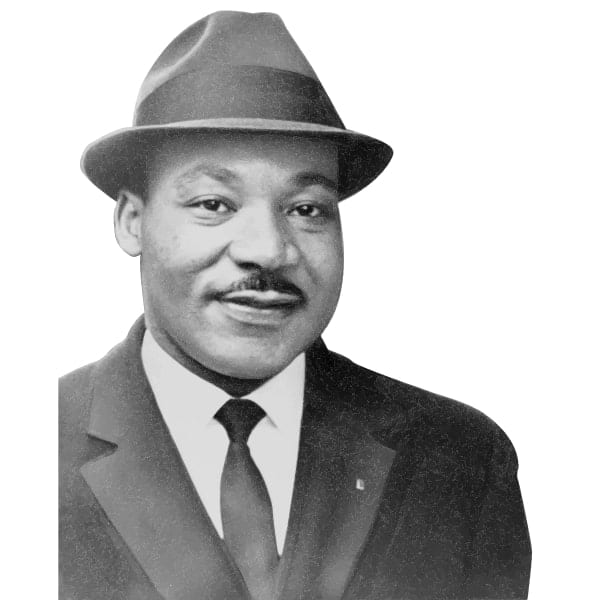“Personalism … gave me metaphysical and philosophical grounding for the idea of a personal God, and it gave me a metaphysical basis for the dignity and worth of all human personality.”
Rev. Dr. Martin Luther King, Jr.[1]
Martin Luther King, Jr. was one of the most inspiring and influential figures of the twentieth century, not only in the United States, but throughout the world. As is the case with most if not all such heroic figures, any careful study of King’s life shows that while he was indeed a unique figure in some ways, he did not accomplish anything alone. His achievements were done in cooperation with countless other people, a few who are famous to us and many unknown to us. As we approach Martin Luther King, Jr. Day on January 16, we are not only honoring him as an individual but also those countless people and the principles for which they stood and sacrificed.
In reflecting upon the ideas and ideals that drove Dr. King and that he communicated to us in both words and deeds, it is compelling for us here at DePaul to note Dr. King’s connection to personalism. We at DePaul, especially in the context of our mission, speak often of Vincentian personalism as a driving force in both the “why” and the “how” of what we do. Personalism is not a term that we take directly from Vincent but one that we have found fitting to describe the core values he lived and, perhaps even more so, the values that the men and women who have served the organizations he founded lived out under his inspiration and guidance. As a philosophical or theological term, it has been used in different ways by many different thinkers starting in the nineteenth century.[2] There are deep connections between Kingian and Vincentian personalism.[3]
As my opening quote illustrates, Dr. King’s understanding of personalism was at the heart of his understanding of the world. In a way that resonates with Vincent’s understanding and with our commitments here at DePaul, personalism defined how Dr. King saw God and how he saw human beings. Each human person was filled with dignity and worth. For King, as for Vincent, this dignity was honored more in practice and in relationship than in abstract philosophy or even theology. King famously hoped that after his life he would be remembered not for his education or awards but as someone who “tried to love somebody …to love and serve humanity.”[4]
For Saints Vincent and Louise and other Vincentians, just as for Dr. King and the countless other leaders and participants in the African American freedom struggle, the sacred insights of personal encounter and individual dignity led to a realization of the need for organization and movement for systemic change.[5] Above all, it led to an understanding that the material and spiritual needs of individuals can only be met in community. DePaul University has the size, resources, and organization to serve many people well. Still, at our best, our students experience DePaul through personal relationships in which they feel seen and honored, relationships in which they feel that they belong.[6]
Dr. King popularized the vision of a beloved community where the dignity of all could truly be honored. He identified the primary obstacles to making this a reality amid the evils of poverty, racism, and militarism.[7] The practice of personalism can give us not only a “why” and a “how” but hope and a deep faith in the purposefulness of our work. We embrace challenges along the way, profoundly trusting in the destination of our journey.
What inspirations do you take from the legacy of Dr. King, personally and professionally?
What challenges do you think these concepts invite us to address as DePaul?
Reflection by: Abdul-Malik Ryan, Asst. Director Religious Diversity & Pastoral Care, Muslim Chaplain
[1] Martin Luther King, Jr., Stride Toward Freedom: The Montgomery Story (Boston: Beacon Press, 2010), 100.
[2] See Stanford Encyclopedia of Philosophy, s.v. “Personalism” by Thomas D. Williams and Jan Olof Bengtsson, 2022, https://plato.stanford.edu/entries/personalism/ and Wikipedia, s.v. “Personalism,” last modified December 27, 2022, 10:50, https://en.wikipedia.org/wiki/Personalism.
[3] King and Vincent would both see all of these concepts as rooted in their shared Christianity and in the teaching and example of Jesus (peace be upon him), but the concepts have also been resonant and inspiring to many who are not Christian, including myself.
[4] See King’s sermon, The Drum Major Instinct, which he gave on February 4, 1968. For more on this, see: https://www.africanamericanreports.com/2018/01/transcript-martin-luther-king-jr-drum.html.
[5] As Guillermo Campuzano, C.M., shared last year, “The systemic racial justice of Dr. King’s utopia is a Vincentian issue that we embrace from our own convictions and for our vocation. His dream is not strange to us. Our Vincentian sociology, theology, and anthropology naturally bring us to this cause. We are on the move, marching with God for a world free of hate.” See Campuzano, “Rev. Dr. Martin Luther King Jr.: ‘We are on the move now… Our God is marching on,’” The Way of Wisdom (blog), January 10, 2022, https://blogs.depaul.edu/dmm/2022/01/10/rev-dr-martin-luther-king-jr-we-are-on-the-move-now-our-god-is-marching-on/.
[6] On the complementary relationship between Vincentian personalism and professionalism, see Mark Laboe, “Both/And: Vincentian Personalism and Professionalism,” The Way of Wisdom (blog), November 8, 2021, https://blogs.depaul.edu/dmm/2021/11/08/both-and-vincentian-personalism-and-professionalism/, and Edward R. Udovic, C.M., “Two Sides of One Vincentian Mission Coin: Personalism and Professionalism,” The Way of Wisdom (blog), January 10, 2019, https://blogs.depaul.edu/dmm/2019/01/10/two-sides-of-one-vincentian-mission-coin-personalism-and-professionalism/.
[7] “The Triple Evils,” The King Philosophy, The King Center, accessed January 5, 2023, https://thekingcenter.org/about-tkc/the-king-philosophy/.
